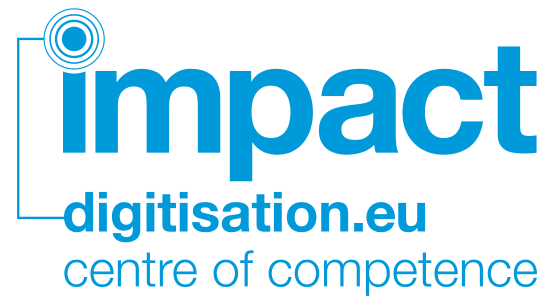On 2 October 2014, the Succeed project organised a technical workshop on the interoperability of digitization platforms at the National library of the Netherlands in The Hague. 19 researchers, librarians, and computer scientists from several European countries participated in the workshop.
The afternoon programme of the workshop further included a number of interactive sessions.
2. What is the value of interoperability?
To start off, we asked the participants to write down their notion of the value of interoperability.
The following topics were brought up:
- Increased synergy
- More efficient/ effective allocation of resources
- Cost reduction
- Improved usability
- Improved data accessibility
3. How would you define the ideal situation with regard to interoperability?
After defining the value of interoperability, the participants were asked to describe their ‘ideal situation’.
The participants mainly mentioned their technical ideals, such as:
- Real time/ reliable access to data providers
- Incentives for data publishing for researchers
- Improved (meta)data quality
- Use of standards
- Ideal data model and/ or flexibility in data models
- Only one exchange protocol
- Automated transformation mechanism
- Unlimited computing capacity
- All tools are “plug and play” and as simple as possible
- Visualization analysis
Furthermore, a number of organizational issues was brought up:
- The right skills reside in the right place/ with the right people
- Brokers (machines & humans) help to achieve interoperability
4. Identify existing barriers
After describing the ‘ideal world’, we asked the participants to go back to reality and identify the most important barriers which – in their view – stop us from achieving the interoperability ideals described above.
In his presentation of the responses to the questionnaire, Rafael Carrasco had already identified the four issues considered to be the most important barriers for the implementation of interoperability:
- Insufficient expertise by users
- Insufficient documentation
- The need to maintain and/ or adapt third party software or webservices
- Cost of implementation
The following barriers were added by the participants:
Technical issues (in order of relevance)
- Pace of technological developments/ evolution
- Legacy systems
- Persistence; permanent access to data
- Stabilizing standards
Organizational/ Political issues (in order of relevance)
- Communication and knowledge management
- Lack of 21st century skills
- No willingness to share knowledge
- “Not invented here”-syndrome
- Establishment of trust
- Bridging the innovation gap; * responsibility
* robustness of tools - Conflicts of interest between all stakeholders (e.g. different standards; which one to use?)
- Decision making/ prioritizing
- Current (EU) funding system hinders interoperability rather than helping it (funding should support interoperability between rather than within projects)
Financial issues (in order of relevance)
- Return of investment
- Resources
- Time
- Commercial interests often go against interoperability
Legal issues
- Issues related to Intellectual Property Rights
5. Formulate an agenda: Who should address these issues?
Having identified the most important issues and barriers, we concluded the workshop by an open discussion centering on the question: who should address these issues?
In the responses to the questionnaire, the participants had identified three main groups:
- Standardization bodies
- The research community
- Software developers
During the discussion, the participants added some more concrete examples;
- Centres of Competence established by the European Commission should facilitate standardization bodies by both influence the agenda (facilitate resources) and by helping institutions to find the right experts for the interoperability issues (and vice versa).
- Governmental institutions, including universities and other educational institutions, should strive to improve education in “21st century skills”, to improve users’ understanding of technical issues.
At the end of our workshop, we concluded that, to achieve a real impact on the implementation of interoperability, there needs to be a demand from the side of the users, while the institutions and software developers need to be facilitated both organizationally and financially. Most probably, European centres of competence, such as Impact , have a role to play in this field. This is also most relevant in relation to the Succeed project. One of the project deliverables will be a Roadmap for funding Centres of Competence in work programmes. The role of Centres of Competences in relation to interoperability is one of the topics discussed in this document. As such, the results of the Succeed workshop on interoperability will be used as input for this roadmap.
We would like to thank all participants for their contribution during the workshop and look forward to working with you on interoperability issues in the future!
Sieta Neuerburg, Koninklijke BibliotheeK (National Library of the Netherlands).



